6 November 15 – Friday
Somehow it became the next day, due to the International Dateline and everything. By the time I staggered off the plane at Taipei I’d lost a day. I felt like maybe I’d lost several. Though I’d spent maybe a total of three hours “awake” on the plane I’d probably not slept more than 5 or 6 hours, and those in short, punctuated bursts.
I met Minshi at the Taipei airport. I had not seen him in over five years, so we spent the entire flight just catching up and making each other laugh. It was a pattern we fell into and that we would enjoy for the duration of the shoot, fortunately. I got the idea that he’s a bit isolated in Taiwan. I probably got that impression from when he told me that he felt increasingly isolated these days. It’s a tough life as a freelancer in the Taiwanese film industry. No unions and bad pay, merciless hours and high demands while on set can make anyone bitter very quick.
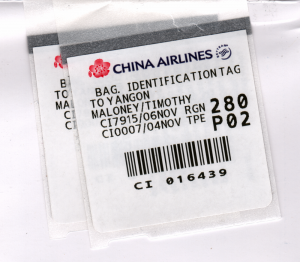
I had no idea if my luggage was okay – it had occurred to me on deplaning that it might not have been transferred, due to being highly explosive, or maybe just due to disorganization. And, once again, perhaps this next plane would go up in flames from all those dangerous Lithium Ion batteries packed away in there. But, as luck turned out, nothing happened at all. When the plane finally set down in Yangon airport I found my baggage easily. Unlike Hae-Jin and Sean, we are not asked for any bribes and pass through customs very easily.
We were found wandering about the airport by Jennifer, Eric’s wife. She took us immediately to a fabulous lunch. She ordered a ton of good, proper Burmese food – enough for an army. I must confess I ate so much I thought I could be sick: tea leaf salad, fried tofu, sautéed greens, ginger salad, and curry – of course. After airline food and no food, I was wolfing it down like there was no tomorrow. Remember that three of the past four meals before I left LA consisted of eggs and not much else.
After the lunch we went to exchange our money. Because there are limits on the amount of money one can transport from one country to the next, Gavin had instructed us all to carry a few thousand dollars of US money so we could convert to local currency for the film. If he took all his money at once red flags would have been raised, and I’m sure we would have been held as terrorists.
Apparently the Burmese require that any bills you exchange be in absolutely pristine condition. Yes, there can be no wrinkle in that Benjamin you’re handing over. They simply will not take it. This is not just a Burmese thing; I’ve heard of it in several Southeast Asian countries. There’s something superstitious about it – as if the condition of the money has something to do with its intrinsic worth. In any event, I also saw Burmese cashiers at the Ruby Mart rejecting 1000 kyet (pronounced “jet”) bills that were torn or taped up, so it’s not like the stipulation only applies to American money. I had wrapped Gavin’s crisp 100s in between cardboard and maintained total flatness the whole way, so I knew we would be good.
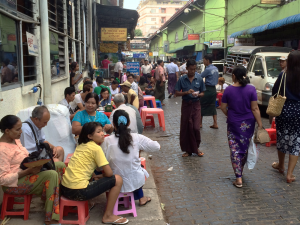
Though we could have gone to a “legitimate” money exchange, Jennifer took us to someone she knew at a counter in Yangon’s Bogyoke Market, which is one of the biggest and oldest markets in the city. Minshi and I were dazed and disoriented, but we followed her to the spot where some guy carefully counted the flawless 100s and handed over a solid brick of local scrip. Ah, the black market! We got a better exchange rate, apparently. One dollar equals about 1200 kyet, so we were instant millionaires. There seemed to be no coins, just bills, and the denominations only went down to about 50. Below that no one keeps any track, I guess. I heard about prices in the single digits (5 kyet for some food item or a telephone call, for example) but the solution seems to be that no one ever bought just one of those items, they were always sold in a batch that would get the cost up to at least 50 kyet. And 50 kyet is, essentially, a nickel.
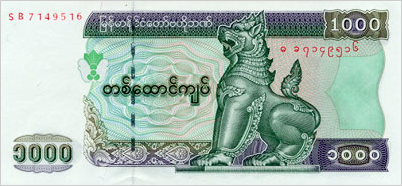
Because our bus trip to Pyin Oo Lwin would leave in the evening and our flight arrived in the morning, poor Jennifer had to figure out how to occupy us for the day. Fortunately it was pretty easy, as everything in Myanmar was new to us. Our next stop was the Shwedagon Pagoda, Asia’s largest pagoda and the holiest of Buddhist shrines in Myanmar. An impressive gilded structure rising over 300 feet above the city, it’s not only a religious center, it’s been the stage for a number of major political events, not the least of which was Aung San Suu Kyii’s speech during the 8888 uprising. Her father, Aung San, considered the father of modern Myanmar and a war hero, had spoken there in 1946 as the start of the movement for independence from Britain. It’s kind of a big deal.
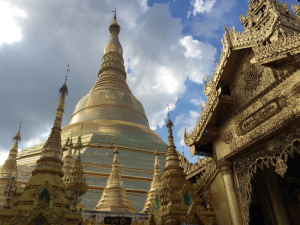
It’s also been around since the 15th century in its current state, and certainly longer in previous iterations. It’s supposedly housing a few of the Buddha’s hairs in some shrine, but we never actually saw the sacred follicles. There’s plenty else, though, and a tour of the place can take a while. One needs only to aim a camera and brilliant shots result. Our luck thus far had been an indomitable force, and we could feel that old Buddha smiling down upon us this afternoon.
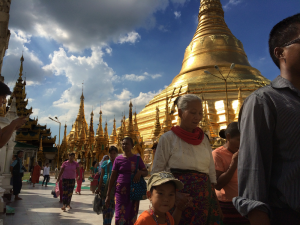
We crawled though the insane traffic to stop at Jennifer’s sister’s place. I was given the opportunity take a shower, which I desperately needed. After more than 30 hours since my last shower I was beginning to smell like vinegar. I had been warned that the plumbing in Myanmar is an iffy proposition, as is the electricity. The water might suddenly stop flowing or be far less than potable. This could happen at any time. Due to possible interruptions in the supply, many people stockpile it in large tubs and containers in their bathrooms. It’s a bit odd in a country known for disease-carrying mosquitoes to keep so much still water around in open containers, but it is the practice here. And bottled water is the only thing anyone would drink – there’s no way you’d sip out of the tap.
Thus when I stripped out of my damp and offensive garments, I was not at all surprised that the shower nozzle reluctantly gave out only a tiny trickle. I was left with the option of dumping a dipper of cold water over me or making do with a hot dribble from the ossified shower head. I had been warned about this kind of activity in Myanmar, so I was fine with it. And considering how hot it was outside I was happy to cool off, even if it were a bit on the shocking side. Yangon is about 32? C (90? F) in November and sweltering.
Soon, I was fresh and clean! And only slightly shivery. Our hosts offered papaya and strongly urged us to nap. Neither Minshi nor I felt much like sleeping – everything was still all new to us, and we were wide awake and taking everything in. Plus, I had just dumped cold water all over myself. But the bus ride to Pyin Oo Lwin would leave at 8PM, and it was then only 3PM. Our hosts kind of did not know what to do with us. They could not really talk to us much. and I, particularly, was strange. A nap would relieve them of the pressure to attend to us.
So, despite our intentions not to, Minshi and I were out like lights the minute we lay down on the floor. Dark and fitful, it was less a comforting nap as it was a temporary blackout, interrupted rather savagely by the passing of a car equipped with a bullhorn, shouting out campaign slogans for the upcoming election. Because we just happened to be there to shoot a movie during perhaps the most important election in Myanmar’s history.
O Myanmar, I have few complaints about you, but this one does stand out. Apparently every single jackass in the entire country who owns a pickup truck at some point outfits it with a giant bullhorn speaker – the kind that are at least four feet wide – and drives around town bellowing or singing off-key. I imagine the driver’s cousin or brother in law sitting in the passenger seat, gleefully belting out campaign slogans or holding the microphone up to the tinny speaker of his phone his phone while it shrieks out pop tunes. There will never be peace in that country until there is a law against hooligans with giant bullhorns on their trucks.
Now roused, Minshi and I were told to get ready – it was time to drive to the bus. Jennifer told us it would take over two hours to drive there in the busy Yangon traffic on a Friday night. Living in L.A. I believed it easily. It can take that long to get from Pasadena to the airport at high rush hour.
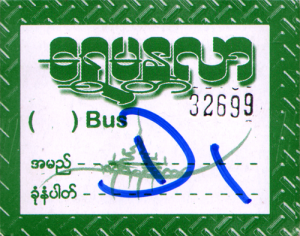
But Burmese traffic is much crazier than L.A. traffic, with cars, buses, trucks, more buses, motorbikes, and pedestrians all crowded and vying for dominance. It was exactly like every disastrous traffic scene in every Asian movie I’ve ever seen, only much worse because we were stuck in it for hours, and no one would tolerate a film about traffic for so long. Bonus construction kept us at such a crawl that at one point we inched forward only about 6 feet in 40 minutes. Jennifer began to panic at this stage, because the 8PM bus departure time was pretty firm. There are not a lot of buses that go to Pyin Oo Lwin. If we missed this one, there would be another one at the same time tomorrow. Maybe, because sometimes things don’t quite go to plan in Myanmar.
Why not? Well, POL is a mountain town, and it’s kind of considered a quaint outback, like a lovely vacation spot or a curious throwback. With a population of over 225,000. But it is nowhere near as “modern” as Yangon, hence the reputation as being a bit out of the way. Even when the British owned Burma it was sort of a summer holiday place – a refuge from the hideous humidity and unbearable heat of “Rangoon.” It may be the outback of Myanmar, but then most of Myanmar is the outback of Myanmar. And for all its sophistication and activity, Yangon is struggling when compared to more advanced and wealthier cities. Myanmar is, simply put, poor.
Which may come as a surprise to older folks who knew that at one time Burma was considered the richest country in Asia, and not just while under British rule.
But now Myanmar is so underdeveloped that everything here seems to be borrowed or left over from some other country. In many cases that’s literally the case. For example, Myanmar imports all its cars and they tend to be used vehicles from Japan and China. Everything there is recycled, reused, repurposed, jerry-rigged, modified, and otherwise kind of jacked-up in the most dangerous way possible.
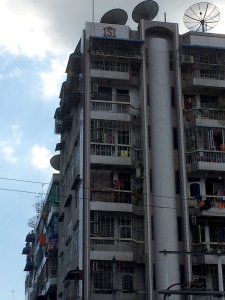
But it’s also true that Myanmar is picturesque, just as an old and decaying ruin can be full of great beauty. The orchid thrives on a rotten log, after all. All around us are people speeding along on ramshackle smoke-spewing vehicles likely to collapse at any minute, living in huts and lean-tos made of discarded advertisements, thriving and surviving in the least of circumstances and conditions. People seem to be living everywhere and on everything, like mushrooms. You can feel energy and – dare I suggest it? – some sense of hope. The election is coming up soon, and the Burmese will be choosing between the old military “green” party that seized power in 1962 and have ruined Myanmar and Aung San Suu Kyii’s NLP party. There is a lot of hope here.
The departure time for the bus crept upon us – we were still blocks away and jammed in traffic. Jennifer’s sister called ahead, hoping to delay the bus from departing on time. I did not know one could do that, but Myanmar is full of surprises. When we do arrive in the knick of time, her sister bossed her way onto the bus to secure us seats. She was our hero. And then, quite suddenly and before we could register it, the bus had pulled out of the station and we were on our way. We settled in for an all-night bus ride to Pyin Oo Lwin – where my fabulous Burmese vacation ended and the doubtless horrors of Gavin’s movie would begon.
We paid extra for the “luxury” bus, with colorful blinking LED lights limning the windows and generous reclining seats equipped with individual MP4 players. All of them are loaded with pirated American movies with Burmese subtitles. I think some of the filenames have “torrent” and “pirate_bay” still on them. “Minions” were quite popular. Minshi found a channel that played some kind of devotional Buddhist tape. It showed a meditating monk onscreen for long periods. I guess you were supposed to be inspired by his meditation and start doing it yourself. I could not hear the soundtrack, but I imagined it was composed of the usual chants and sutras.
The transportation company also provided a can of Sprite, a bottle of water, and some kind of bread/cake dessert for each passenger. Within ten minutes of departure everyone tore into the wrappers and snapped open the aluminum cans, crumbs flying everywhere.
The bus lurched off into the night and Minshi and I already feel Morpheus dragging us down into slumber. For reasons that are not at all clear, the bus driver kept the air conditioner down to subzero levels. Icicles form in our nostrils. This necessitated we all huddle under the giant blankets each seat was equipped with. The blankets are warm and soft, so we all snoozed well. I doubt anyone made it to the end of the movies, neither Minions nor mantras. But it is curious why the bus driver would keep the atmosphere so frigid. It was as if he wanted us to enjoy the blankets, but we could not do so unless the temperature was artificially driven to uncomfortable levels. In any event, the warmth of the blanket triumphs over all, and the bus hurtles on through the blackness. There seem to be few cars on the road, only the open expanse of undeveloped Burmese countryside, and a thin ribbon of highway only lit by the headlights on the bus.
Around 11:25 PM the bus suddenly pulled into a rest stop. We figured it was a mandatory break and a chance to switch drivers. We were all ordered off the bus. Since we had no guide we were completely unsure what to do. Why did we all have to get off? Perhaps this discouraged thieves from rooting through everyone’s stuff? We have no idea how long we were going to be there or what is happening. We were sure that someone must have told everyone how long the break was, but with no way to understand anyone, it’s not like we could plan on anything. Of course we had to find a restroom – how long is this break?
The rest area was crowded, with numerous buses parked. A busy restaurant, little more than a kitchen adjacent to a line of picnic tables under a canopy, doled out endless bowls of noodles. Clouds of smoke from cigarettes rose into the inky black sky. A night-time oasis of noise and smells.
It was actually a dinner break, we later figured, and we could have ordered some food if we had any money on us. Apart from the giant cash brick, which was for the production, we did not have any money, and I certainly did not want to start peeling through a giant cash brick in front of anyone. So we sat in the cool night, swatting at bugs and waiting for them to let us back on.
At the stop I see a young girl – probably high school-age – in a bright red shirt emblazoned with gold letters. Across her chest it says “MELONS.” They weren’t. I’m not trying to be mean – she was a beautiful girl with a lovely figure – it’s just that they really didn’t quite qualify as “melons.”
Soon enough we were allowed back on the bus and were settling in under those warm blankets again. There was a couple behind me who begin cracking pistachios like a couple of parrots, but sleep could not be brokered any longer, and I went down.
Shortly around 4:30 AM I was awakened by the Number-Two-Snore-Bear-of-the-World who starts making a wheezing racket like a dysfunctional iron lung. Apparently he was the driver from the first lap, sprawled out on the seat right behind my head. I was not the only one distressed by the racket. His choking, gasping, buzzsaw breathing was so awful as to keep most of the bus awake for at least an hour and a half. I kept shaking his leg to wake him up, hoping he’d turn over and leave us all alone. He never seemed to wake up entirely, and certainly never worked it out that he was torturing the entire bus. A terrible night’s sleep for everyone.
